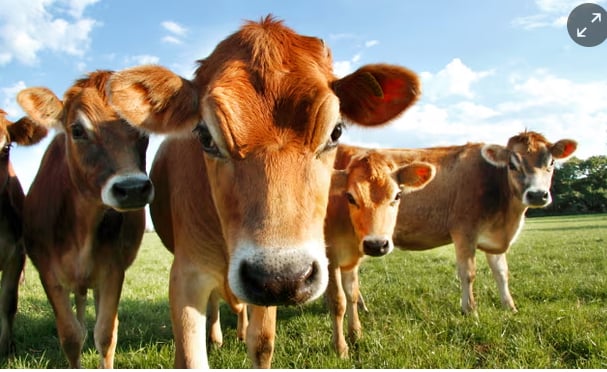June 17, 2025 | 05:31 GMT +7
June 17, 2025 | 05:31 GMT +7
Hotline: 0913.378.918
June 17, 2025 | 05:31 GMT +7
Hotline: 0913.378.918

Bird flu has been detected in some cattle herds and their milk in the US.
Ministers are preparing to introduce legislation that will permit the growing of gene-edited crops in England and Wales. But the new legislation will not cover the use of this technology to create farm animals that have increased resistance to disease or lower carbon footprints.
The decision has dismayed some senior scientists, who had expected both uses of gene editing would be given the go-ahead. They fear the decision could hold back the creation of hardier, healthier herds and flocks. Animal welfare groups have welcomed the move, however.
Gene editing involves making slight changes to plant or animal DNA to create new strains or breeds. The technology has been replacing the techniques of genetic modification (GM), which involve the transfer of entire genes from one species to another and has been strictly regulated by the EU.
The Genetic Technology (Precision Breeding) Act, which approves the use of gene-editing technology, was passed by the previous government. But secondary legislation is needed to implement the law and this was not passed before the general election.
The farming minister, Daniel Zeichner, has since announced the current government would pass that secondary legislation, but only for plants and the food and feed derived from them. “No decision has been taken on bringing forward legislation that enables the Precision Breeding Act for animals,” a spokesperson for the Department for Environment, Food and Rural Affairs said last week.
Scientists working on diseases in animals were critical of this inaction. “This could have a detrimental impact on the research landscape in this country,” said Prof John Hammond, director of research at the Pirbright Institute, near Woking. “In an age of climate change and other threats, we need to be able to make the best use of technologies like gene-editing to improve the lives of animals.”
Prof Helen Sang of the Roslin Institute in Scotland agreed. “With a virulent strain of porcine reproductive and respiratory syndrome wiping out pig herds in Spain, African swine fever on the march north through Europe, and bird flu virus detected in both dairy cattle and their milk in the US, the importance of enabling all potential solutions as soon as possible, including precision breeding, cannot be overstated,” she wrote in a letter to environment ministers.
However, the decision to indefinitely delay the introduction of gene-edited animals was welcomed by Penny Hawkins, head of the RSPCA’s Animals in Science Department. “Every year, about 12% of food from animals is wasted. So it is completely unethical to push animal productivity even further when so much is thrown away already,” she said.
Hawkins added that there was some argument to support the use of gene editing to create species better able to resist diseases. “However, in most cases, diseases are preventable through good housing, husbandry and care and veterinary surveillance. Directly editing animal genomes should be seen as a last resort,” she said. “And what happens if a gene edit proves to be unstable? How will this be detected, and how will these animals be safeguarded and brought back into conditions where they can be properly monitored?”
Other scientists point out that the UK is one of the world’s leaders in the field of gene editing of animal breeds and related technologies. If British researchers are prevented from developing their research then there is a real risk their expertise will wither and the country will lose investment and scientific talent.
“We are creating the opportunities to enhance animal health and welfare, reduce the burden of disease, but we are not creating the opportunity to actually manifest that in the UK – unlike many other countries, such as the US and Brazil,” added Hammond.
“I can see a situation where we export our knowledge but end up having to import the products created from that knowledge.”
Prof Johnathan Napier, the science director at Rothamsted Research in Hertforshire, said that the government’s enthusiasm for plants over animals could be explained – at least partly – by the fact that there were potentially many more gene-edited crops in the pipeline than gene-edited animals. “On the other hand, if you have a technology that could reduce the susceptibility of farmed animals to some pretty unpleasant diseases, why not use it?” he added.
(The Guardian)

(VAN) Extensive licensing requirements raise concerns about intellectual property theft.

(VAN) As of Friday, a salmonella outbreak linked to a California egg producer had sickened at least 79 people. Of the infected people, 21 hospitalizations were reported, U.S. health officials said.

(VAN) With the war ongoing, many Ukrainian farmers and rural farming families face limited access to their land due to mines and lack the financial resources to purchase needed agricultural inputs.

(VAN) Vikas Rambal has quietly built a $5 billion business empire in manufacturing, property and solar, and catapulted onto the Rich List.

(VAN) Available cropland now at less than five percent, according to latest geospatial assessment from FAO and UNOSAT.

(VAN) Alt Carbon has raised $12 million in a seed round as it plans to scale its carbon dioxide removal work in the South Asian nation.

(VAN) Attempts to bring down the price of the Japanese staple have had little effect amid a cost-of-living crisis.